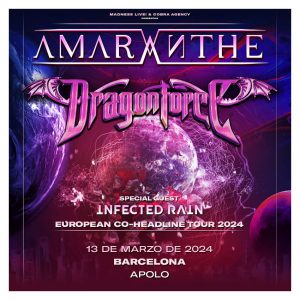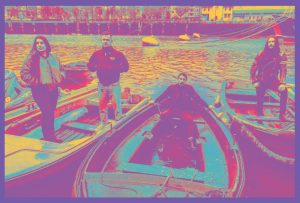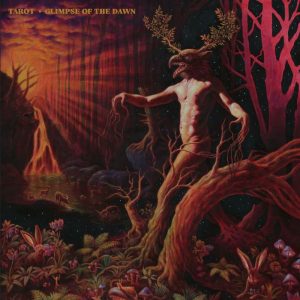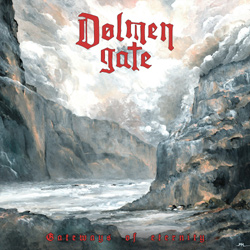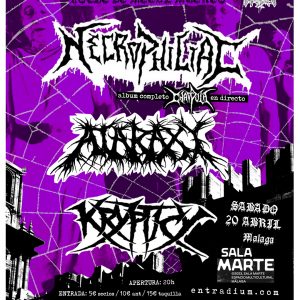DAYLIGHT DIES (Eng.)
– Hi, thanks for your time. What are you currently up to? How is everything doing right now with DAYLIGHT DIES?
Egan O’Rourke: Thanks for taking the time to talk to us. Things are good. We’re gearing up for the release of «A Frail Becoming»and are really excited for our fans to hear it.
– You have just released your first album in 4 years, «A Frail Becoming»; what are your expectations on it? Is still an exciting moment for you or, after 4 years, is it more like a liberation?
Egan O’Rourke: It’ some of both. Obviously it’s exciting to hear the fruits of our labor. On the other hand, I don’t think we’ve ever worked harder or longer on anything before. Ultimately we really hope people respond to the songs because we’ve put everything we have into this effort.
– All your previous albums have been acclaimed both from the fans and press so, do you think this fact can make you work under more pressure when creating a new opus? As people may always have really high expectations.
Nathan Ellis: The only pressure we feel is that which we place on ourselves to write music that we would want to hear, and that connects with people on an emotional level, and then to bring our best performances to the songs when we record them. So far we’ve been able to earn a devoted fan base, and we’ve done that by focusing exclusively on writing music that conveys the mood and emotion that we’ve become known for. Listening to music in this style is a very personal experience, and one that is different for each individual; We can’t foresee how an album will be received by the world, so spending time worrying about factors that are outside of our control, or trying to write music to please anyone other than ourselves, would be counter to what has resulted in any of the praise or acclaim we’ve earned.
– You have an enormous potential and you’ve showed it with all your albums, in fact I think you are an underrated band. What do you think you would need to get to the next level and establish your name into the scene?
Nathan Ellis: Thank you for your kind words. I feel that this is our best album to date, but I also believe that we’ve only scratched the surface of what we’re capable of doing as a band, and I’m very excited to see what the future holds for us. While I appreciate your sentiment, I do think the term «underrated» is a bit subjective. In terms of notoriety amongst the masses, we may not be so well known, but for those who prefer their death metal to be of the dark and melancholic variety, I believe we’ve earned quite a good following around the globe. We realize that the introspective style of music that we write isn’t for everyone, and we’re very comfortable with that notion. In terms of increasing our profile, we do want to tour more, and particularly to get a proper chance to play for our European fans, but given the economic realities of touring, and the music industry today, we have to be selective in the opportunities we take, and choose only those that give us the best chance to not only play in front of our current fans, but also for as many people as possible who would likely be receptive our music that haven’t already heard us.
– On your new «A Frail Becoming» we can find ideal moments for depression, seclusion, aggressiveness, etc., but always with a really good balance. Is it easy to create such a good balance between opposite elements? And how important are this kind of contrast on the album?

Egan O’Rourke: We’ve always striven to have songs and albums that are interesting back to front. Dynamics are a big part of crafting such interest but I think they’re also part of telling a whole story with a song. Some listener might view our range as limited because of our focus on dark emotions but I think there is an incredible amount of range there to explore. The goal is paint the nuances of the emotions and to capture the complexity of fleeting moments.
– This shows a really well-cared and superb songwriting, and in this sense I’d say you have gone a step further so, could you say this is the album you have always dreamed of?
Egan O’Rourke: That’s tough to say. If you told me ten years ago that we’d be writing an album from across the country with minimal rehearsals or that I’d be a primary writer I would have laughed at you. But that’s what this record is. It’s the product of tenacity, passion and brotherhood. So while I can’t say this is the record any of us dreamed of, I can say that this is the one I’m proudest of.
– Due to this I would like you to tell us how was, or how uses to be like, the songwriting process in DAYLIGHT DIES. Has it changed compared to previous albums?
Egan O’Rourke: Historically the Daylight Dies writing process consisted of Barre writing and demoing riffs and then bringing them to rehearsals three day a week where we would hammer them together. Then we’d demo the songs as a band, tear them apart and start again. We’d end up working on things for months and throwing away hundreds of riffs.
This time around Barre and I would write nearly completed songs and send them out for comments. For about the last year, Barre and I worked on demos tweaking arrangements and helping to flesh out each other’s ideas. We would present the songs to the other guys for comments, final tweaks, and vocal writing. The result is that we wrote some things that unintentionally pushed everyone out of their comfort zone which was challenging but ultimately created a more varied album.
– On my opinion it’s also one of your most diverse efforts. Did you consciously want this dynamism or do things just flow naturally?
Egan O’Rourke: Some of both. Barre wrote differently throughout the process and I think that was organic because he was going through a lot of life changes. It took me a decade to be able to really understand the complexity and nuance of how Barre writes but my stuff still sounds quite different. These factors meant that the songs had more differences to start with but once we had them we worked to amplify the things we were doing. How can we make this meaner? More maudlin? Darker? Some of it was writing and other parts performance but we wanted each part to set a decisive tone.
– Each song is a different world with a different story; where do you take inspiration from to craft them?
Nathan Ellis: All of our lyrics come from an intensely personal place. They are snapshots of, and metaphors for the trials and struggles that we experience in our own lives. They are reflections of the world as viewed through the bleak outlook of Daylight Dies.
– And what’s the concept behind the lyrics on this opus?
Nathan Ellis: Rather than give an explanation of the lyrical subject matter, I prefer not to go into specifics, and to allow each listener the chance to find their own meaning in them. What one person hears as a song about a change of seasons, or growing older and the loss of youth, another may see as a metaphor for the hopelessness and despair that is felt after the death of a loved one, or the end of a relationship. We’ve heard from many people that our music has helped them through difficult personal times, and that they identified strongly with certain lyrics that they felt related to their situation. In many cases, their situations were very different than the events in our own lives that the lyrics were written about. Everyone experiences struggle and tragedy throughout life, and when an album becomes part of those moments, or part of the experience of healing after them, the music takes on a meaning of its own, and becomes something much more personal for the listener. For me, this is the beauty of writing the kind of music that we write, and an integral part of the enjoyment that I get from listening to music in general, so I’ll leave the meanings open to interpretation.
– With «A Frail Becoming» you’ve managed to get a really clean and organised sound so, are you satisfied with the work done by Jens Bogren? How was the production process for this opus?
Egan O’Rourke: Jens is fantastic and a real joy to work with because we know whatever we’ve done he’ll improve.
The production process was extremely long this time. We did the drums at a local studio with my good friend Jason Richmond and then did everything else at my house. Guitars, bass and vocals were all drawn out across several months as we stopped briefly to do some dates in Europe. We’ve done all of our records with that studio hybrid approach and it works for us.
– On the other hand, what does the cover artwork represent? If I’m not mistaken the layout designed by Agni Kaster contains a photography by Jonathan Mehring. Would you please mind to shed some light on this?
– You have also done a video for «Dreaming of Breathing», which will be released in a few days. What will we find on it? And how was working with Ramon Boutviseth like?

Nathan Ellis: I’ll answer these two questions together, as the answers for both are related. We’re very selective in the individuals that we choose to work with, and only work with people who understand, and can expand on our vision with their own creative ideas and interpretations of our music. Johnathon, Agni, and Ramon are all incredibly talented artists, who have been great to work with, and who we’ve been lucky enough to work numerous times. They are people that we share similar outlooks and ideals with, and who we trust enough to collaborate with. We give them a general idea of what we’re looking for, and allow them the creative freedom to come up with an idea or concept, they’ll come back with their ideas, and we’ll come to an agreement on the final concept. As to what the artwork represents, since the layout, photography, and video are all part of the experience of an album or song, I prefer to leave the interpretation up to the listener, rather than giving absolute explanations. I will say that I am incredibly proud of all of the work they did with us. I believe they added layers and depth to the overall experience of the album, and I think when viewed as a whole, the people that enjoy our music will agree.
– All this about «A Frail Becoming» being said; how could you describe it in just 3 words?
Nathan Ellis: Ominous, Brooding, Despondency.
– A band that reminds me somehow to you is KATATONIA, which throughout its years of career has been through a clear evolution. How do you see has their evolution been during all these years? Do you think the same could happen to DAYLIGHT DIES? As, beside moving toward different musical directions, they have also had some major line-up changes.
Nathan Ellis: Other than to say that I’m a fan of Katatonia’s music, through all of their eras, I can’t really comment on their evolution. They are one of the very few bands that, as fan, I can rely on to consistently release albums that deal with the dark and introspective subject matter that I gravitate toward in music. To be as far into their career as they are, and to have unfalteringly released album after album of brilliant music without becoming stagnant or complacent is a testament to their talent and commitment to their art.
As people, and as artists it is natural to want to grow, try new things, and become better at your craft, so changes in a band’s sound are to be expected. In terms of the evolution of Daylight Dies’ sound, we’re very aware that what defines us as a band is our desire to dwell on, and examine the darker emotions and subjects of life. We’ve always had a very clear idea of the kind of music that we want to make, so I don’t foresee the need or desire to make any abrupt changes in our sound, and instead letting our evolution be a natural one, as we have to date. Daylight Dies is an extension of who we are as people, so while the musical techniques and sounds that we use to convey those emotions may evolve, I can say without hesitation that the melancholy and sorrow that we’re known for will be always be present in our music.
– Anyway you are a band with a sound we are not so used to hear from the US so, do you think you are more successful en Europe than in the USA?
Nathan Ellis: Since many of our musical influences dating back to our teenage years were bands from the UK, Sweden and Finland, this sound comes very naturally to us. I think we’ve developed a devoted following in Europe and the US, but I do think we have a sound and style that seems to be more well received in Europe and we want to expand our presence there soon.
– And are there any similar bands to you from America that you could suggest?
Nathan Ellis: Other than bands that I’ve listened to for many years, my knowledge of bands from the US is limited. As far as I know, there are none that I would call stylistically similar to us.
– Finally, what are your near-future plans?
Nathan Ellis: Currently we’re focused on getting «A Frail Becoming» out into the world. We’re extremely proud of the album, and hope to have some opportunities to play these new songs live for people either late this year, or in early 2013. Outside of those, only time will tell.
– That’s all, thank you once more for answering our questions. If you want to add some final words; feel free to do it.
Other than to say thank you for supporting Daylight Dies, and that we appreciate it very much, I’ve nothing more to add. Salut!

